If I have to choose between Gâteau de Zoé:

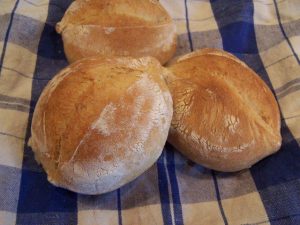 Its not a good idea to declare on thursday that I am done with baking for this week because on friday, when I see all the beautiful loafs and rolls on YeastSpotting, I always find a lot of things I want to try immediately. This time, I saw the Ceriola from La cocina de ile and could not resist. The picture was so promissing.
Its not a good idea to declare on thursday that I am done with baking for this week because on friday, when I see all the beautiful loafs and rolls on YeastSpotting, I always find a lot of things I want to try immediately. This time, I saw the Ceriola from La cocina de ile and could not resist. The picture was so promissing.
But the two years of learning spanish in school had passed me without having a great impact on me. I still rember some words but thats not enough to translate the recipe. With the pictures I get roughly the meaning, but it was not enough to understand it entirely. But luckily there is the Google translation service and the online dictonary Leo. With some help from both of them, I did the translation rapidly. Just the term Masa madre gave me some troubles – but here google could help me too: it is sourdough!
The methode of forming the rolls is shown in this video. Its not so complicated: just form nice bowls, then use the edge of your hand to press in the middle of the bowl. Then fold it together and roll the ends together, giving the roll two pointed Ends. I did this not carefully enough, so I lost most of this pointed ends during the rising Periode. Continue reading
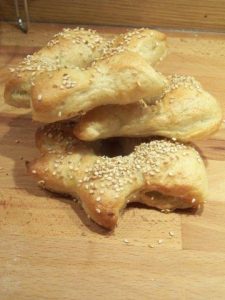
When I see the topic of the 17. Bread Baking Day this recipe came directly to my mind. I was thinking about trying it for a longer time, I just had no opportunity untill now. I knew the methode to form the stars allready from Bertinets “Dough”. Its so stunning, how two simple cuts could have such a nice effect!
For cooking the potatos I used this time the microwave. Its a simple trick, my collogues use for cooking potatos for lunch at work. Just wash the potatos and then pierce them with a fork for four or five times. Then put the wet potatos to a plate, suitable for microwaves, cover them and cook them at 750 Watt for 2 to 5 minutes, depending on their size. Continue reading
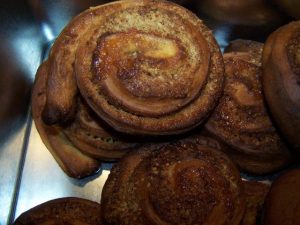
After finishing his Ph.D. last month my colleague and labbench nighbour Channa will leave us to take a job as post-doc in Cork (Ireland). What a strange feeling..
At friday we had a farewell party, and I promised to bring something sweet. It should be something, that could be easyly transported with bus and train, because I did not want to drive with our car when it is snowing.
After thinking a while I decided to do some sweet rolls. I did not like to do cinnamon buns again, but I had some left over nuts and almonds in the cupboard – so I decided to do sweet nut rolls. The filling is inspired by the glaze of sticky buns.
Update: After we tested first the (extremly sweet) indian Sweets, my colleague from China thought the rolls were “something salty, maybe a kind of bread” lol Continue reading
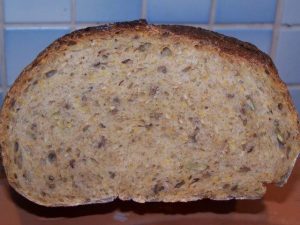
Neben den Saaten beinhaltet das Brot verschiedene Mehlsorten: weißes Weizenmehl, Vollkorn-Weizenmehl, Roggenmehl und Polenta. Leider leide ich unter einer Roggenunverträglichkeit, also habe ich die 50g Roggen durch Dinkel ersetzt.Die Polenta, die ich verwendet habe ist von Alnatura, und von einem so starken Gelb, dass man die Körnchen sogar noch im fertigen Brot erkennen kann. Bei der konventionellen Polenta, die ich bisher verwendet hatte, war die Farbe deutlich schwächer, aber mir gefällt die neue Variante besser.
My everyday bread is a simple whole grain bread, which I bake nearly every week. But from time to time I like some change on my plates, and then I bake another of my favorites: Seeded Bread from Bertinets “Crust” with some small adjustments.
The Seeds I prefere in this bread are rolled oats (Ok, thats not a seed, but its so delicous), sesame, poppy seeds and pumpkin seeds. Sometime I add flax seeds and sunflower seeds, too. But sunflower seeds ar rare in my breads, as long as my sweetheart is around, because in his surrounding sunflower seeds seldomly survive the time between buying them and baking bread.
There are diffrent flours in this bread, too: white wheatflour, whole grain flour, rye and corn flour. Because I am intolerant against rye, I subsitute it to Spelt. The organic corn flour that I used this time has a nice dark yellow colour, and its visible in the baked bread, what I like. With the non-organic corn flour I did not get this effect because its colour is much paler. Continue reading
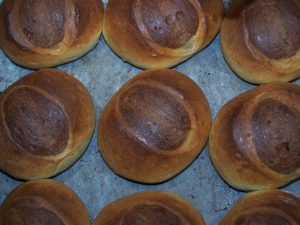
Our local baker has delicous sweet buns called “Kakaoweckchen”. They have a core of dark cacaodough surrounded with white dough. The cacaodough break through the cut on the top of the bun, giving an impressive effect.
At my last breakfast in the café belonging to the bakery I thougt about how to make this buns by my own. I decided to use the “sweet dough” from Bertinets “Dough” as a basis. The only change I made was using a preferment. After finishing kneading, I mix half of the dough with some cacao and water, but that did not work so well, so the next time, I would make two batches of dough, mixing the cacao with the flour directly. Continue reading
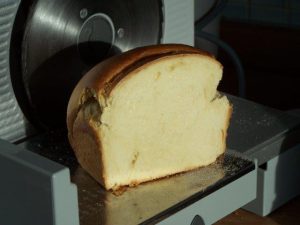 The Hokkaido-Milkbread was very often baked during 2007 as you can see in this blogs: here, here, here, here and here. And if you searching with Google you will find much more pages. You can find the original recipe here. In 2007 I baked this bread of course too. But while I baked new recipes, I forget about the Hokkaido-Milkbread.
The Hokkaido-Milkbread was very often baked during 2007 as you can see in this blogs: here, here, here, here and here. And if you searching with Google you will find much more pages. You can find the original recipe here. In 2007 I baked this bread of course too. But while I baked new recipes, I forget about the Hokkaido-Milkbread.
But its a very delicouses sweet Bread with a nice, soft crumb. The perfekt Breakfeastbread.
It`s time to bake it again! Continue reading